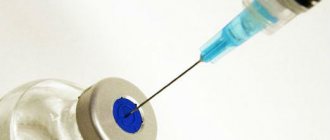Planning a pregnancy is a whole complex of activities. Partners must undergo a full examination, as well as a course of taking special vitamin preparations. This may be news to many, but when planning a pregnancy, vitamins, or rather, vitamin-mineral complexes, are needed not only by women, but also by men. After all, one of the tasks of preparing for conception is to improve the functioning of the reproductive systems of future parents and increase the chances of pregnancy. At the same time, men and women need a different set of vitamins, minerals and other nutrients.
How to test your fertility
You can start with a simple fertility test, which exists in many versions on open Internet sources. A simple algorithm for analyzing answers to questions about age, the presence of diseases and surgical interventions, cycle regularity, bad habits and other parameters assesses the level of fertility.
Of course, such a test may be more of an informational test and cannot be considered a real diagnostic tool. But it is also a reason to think about the correspondence of lifestyle and health to the task that the couple sets for themselves.
Other types of fertility tests have been developed for home use by both men and women and are already on the market. The first, for men, determines the number of sperm in semen, but does not provide any information about their viability and activity, which are key factors for male fertility. Therefore, the practical value of such a home test is questionable. However, it may turn out to be a good motivator for the future father and make him think about his male health. The second, for women, is an ovulation test, the onset of which is signaled by an increased level of luteinizing hormone (LH). However, such a test does not show what stage of this stage a woman is at. If you've been keeping a diary of your menstrual cycle for a long time, you may already be well aware of your ovulation days, and this knowledge will soon come in handy. If not, you can start recording your morning basal temperature to see if you're ovulating.
To get the most complete and reliable information about whether you can have children, you need to undergo a series of tests by consulting a doctor. We will talk about them below.
If a couple is determined to make major changes in their lives, it is better to begin thorough preparations for pregnancy. What is included in the concept of “pregnancy planning”? Let's talk about it.
When checking a woman's fertility, AMH - anti-Mullerian hormone - is a very important indicator. It is not included in the list of hormones initially tested, but is an important marker of functional ovarian reserve.
Folk remedies to stimulate ovulation
There are a large number of so-called folk remedies that can stimulate ovulation and help spontaneous conception, but their effectiveness has not been proven by specialists.
When stimulating ovulation at home, you can use decoctions of sage, plantain and aloe, which motivate the necessary process. The result is obtained due to the content of phytoestrogens in herbs, which can work in a similar way with female hormones, provoking the release of eggs from the ovaries. The action of decoctions is most effective in the first period of the menstrual cycle. For the second period, a decoction of boron uterus is more suitable, since this medicine is more similar to progesterone, secreted by the female body and promoting the consolidation of the embryo. You can stimulate ovulation using essential oils based on cypress, basil and anise, which also stimulate the production of estrogen in the body. A special diet, as well as taking vitamin supplements, helps stimulate ovulation, but these details should be discussed with a reproductive specialist and nutritionist, who will help you choose the most effective and relevant ways.
How to prepare for pregnancy
Start preparing for pregnancy at least three months in advance, and preferably a year in advance.
In order for your future pregnancy to be easy, and for your baby to be born strong and healthy, you need to make sure that before conception you get rid of bad habits and bring your lifestyle and physical condition into line with the upcoming changes. What do you need to remember when preparing your body for pregnancy?
- Nicotine, alcohol, drugs. Smoking is associated with 20 to 30% of cases of low birth weight babies, up to 14% of premature births and up to 10% of deaths of children after birth. A safe dose of alcohol for consumption while expecting a baby has not yet been clinically established. Even soft drugs increase the risk of miscarriage, premature birth, intrauterine fetal death, developmental delays, and later learning and behavioral problems. Taking all these substances and pregnancy are incompatible.
- Medicines. Some medications can cause birth defects. Be sure to inform the doctor who is preparing you for pregnancy and will manage it about all medications you are taking.
- Chemical substances. Some chemicals are harmful to the fetus, especially in the first trimester. The period of pregnancy from 3 to 8 weeks, when the central nervous system in the form of a neural tube begins to form, is the most sensitive. The situation of interaction with chemicals is all the more dangerous because during the most sensitive period of intrauterine development of the embryo, a woman may not yet suspect that pregnancy is occurring.
- Stress. Stress has been linked to irregularities in the menstrual cycle, including delayed and absent ovulation. Free yourself from stressful conditions and situations as much as possible. Relaxation techniques, yoga, and meditation can help balance the level of internal emotional stress.
- Caffeine (coffee, cocoa, tea, chocolate, cola). Studies have linked high-dose caffeine consumption to difficulty conceiving, with some citing a decline in fertility by up to a third.
- Excessive physical activity. They affect the fertility of both women (they reduce progesterone production and disrupt the cycle) and men (especially in combination with sports nutrition).
If you have mentally ticked one or more of the boxes mentioned above, change your bad habits to new ones. What can you do to enter pregnancy with confidence in your good physical and psychological shape?
- Get a medical genetic examination.
- Be physically active. The minimum recommended weekly physical activity is 150 minutes of aerobic exercise, or 5 times 30 minutes (maximum - 5 hours per week). Find a form of physical activity that you enjoy and stick with it. If you're not into sports at all, choose walking at an intense pace (don't forget that the load and calorie consumption when walking is lower than when doing aerobic exercise).
- Bring your weight back to normal. It is known that both deficiency and excess weight can affect the successful course and outcome of pregnancy, as well as fertility itself. To determine your optimal weight, you can use the formula for calculating body mass index (BMI): BMI = weight (kg) / height (m)2. Having calculated your index, compare it with the norm and think about what you can change in your lifestyle if your numbers do not fit into the desired range of values.
- Eat right, provide your body with all the necessary vitamins (first of all, you will need folic acid and zinc). If you have severe vitamin deficiencies (this can be shown by tests, as well as your own condition), start taking prenatal vitamins. Which of them is better - discuss with the doctor who is preparing you for pregnancy.
- Get plenty of rest, relax, get enough sleep, and maintain a positive mental attitude.
- Monitor your cycle and ovulation.
Let's take a closer look at some of the most important aspects of pregnancy planning.
HCG preparations
After the ultrasound shows that the follicles have grown to the desired size (20–25 mm), injections of human chorionic gonadotropin (hCG) are prescribed. These are also hormonal drugs that help you get pregnant. HCG is administered one day after the last dose of Menogon, Puregon and other drugs. The hCG hormone is contained in the drugs Pregnil, Horagon, Profazi, Gonakor and others. HCG hormone preparations are prescribed as a one-time dose of 5,000–10,000 IU. A day after the injection, ovulation occurs. For the therapy to help, you need to have sex a day before the injection of hCG drugs and for another 24 hours after.
Progesterone preparations
If the effect of the above drugs is positive, then progesterone drugs are prescribed. They help “consolidate” the pregnancy. Duphaston and other progestin tablets that help you get pregnant are prescribed individually.
In many cases, hormonal therapy, the regimen described above, helps women cope with the problem of “I can’t give birth and carry a child.” With the development of medicine, more and more women are able to experience the happiness of motherhood and forget about the times when they started topics on forums with the title “I can’t give birth.”
Medical examination before pregnancy
Some health conditions may affect your ability to conceive. These include: structural features and condition of the pelvic organs, diabetes, high blood pressure, anemia, problems with the thyroid gland, and genital infections.
Therefore, the main task facing you is to identify all health problems and, if possible, eliminate them as much as possible before pregnancy.
It is best to start planning a pregnancy with a visit to the doctor, followed by a medical and biological examination and genetic consultation.
Palpation of the pelvic organs
Examination of the uterus by touch is also mandatory; manual examination of the uterus and ovaries is also mandatory. Normally, the cervix should be tilted back, have a dense structure and an almost closed entrance to the canal. If the cervix is shortened by less than 2 cm and the cervical canal is accessible for insertion of a finger, it indicates isthmic-cervical insufficiency.
The size of the uterus does not exceed the size of a fist, so a change in size indicates a tumor or fibromatous node. If the patient is confirmed to have uterine fibroids, pregnancy will be postponed. If the nodes are very small, then nothing will interfere with the development of the fetus. For a more reliable result, if uterine fibroids are suspected, the woman is sent for an ultrasound.
The normal shape of the uterus is pear-shaped. The round shape occurs with endometriosis, an autoimmune disease in which the endometrium extends beyond the organ. Lumpiness of the uterus indicates fibroids or other abnormalities.
Normally, the uterus is located exactly in the middle between the rectum and the bladder. The body of the uterus is located anteriorly. Its deviation back or to the side indicates adhesions. In nulliparous women, the cervix is deviated posteriorly and forms an obtuse angle with the body of the uterus. The bending of the uterus not forward, but backward causes problems with conception, because it will be difficult for the fertilized egg to attach.
The gynecologist also feels the ovaries. With polycystic disease, the ovary is sometimes larger than the uterus, and in this case it is almost impossible to get pregnant naturally. The doctor also pays attention to the connection of the pelvic bones and will identify an anatomical narrowing of the pelvis, if any.
Consultation with a doctor before pregnancy
Based on the results of the examination, the doctor will give recommendations for correcting conditions if disturbances were found in the functioning of one or another body system. All detected infections, acute diseases, and dental problems should be treated before pregnancy. This will not only increase the chances of conception and a pregnancy uncomplicated by any side conditions, but will also lay the foundation for the health of both the child and the mother for years to come.
In some cases, a couple may need separate genetic counseling. According to available data, from 3 to 5% of children are born with congenital malformations or serious hereditary diseases.
Medical genetic testing is aimed at identifying potential risks of transmitting hereditary diseases to a child. A geneticist identifies families with an increased risk of such diseases, studies and analyzes the problem, searches for and recommends a possible solution.
Although genetic counseling can be beneficial for any couple planning to have children, only a small percentage of families will have a strong indication for this procedure. This group includes:
- couples with a hereditary disease in one of their close relatives;
- couples who already have a child with developmental defects or genetic disorders;
- couples in which one or both partners are over 35 years old;
- consanguineous married couples;
- women with previous experience of miscarriage, frozen pregnancy, intrauterine fetal death or stillbirth.
The questions that are raised during a conversation with a genetic counselor include: family pedigree, family history, cases of serious physical, mental and mental illnesses in relatives, existing and treated diseases of future parents, medications currently taken, living conditions, work and rest and other medical, psychological and social factors.
Based on the results of the conversation, if necessary, additional cytogenetic, molecular genetic and other laboratory tests may be prescribed.
After analyzing all the collected information, the geneticist makes an approximate prognosis for the health of the unborn child and gives parents recommendations on further actions.
The couple underwent an examination, received and followed the doctors’ recommendations - and a new question was on the agenda: how to bring “Day X” closer - the very day when the idea of a child will come true?
When to plan a baby
In the process of planning a pregnancy, it is necessary to carefully analyze the current situation and look a little into the future. Of course, it will not be possible to foresee everything that can happen, but some points can still be thought through. Experts recommend starting preparations for conception six months or at least 3 months before pregnancy. But this is provided that outwardly there are no signs of illness in both parents. If at least one of them has current or hereditary disorders, the period is increased.
Nutrition rules in preparation for pregnancy
If you haven't yet started a healthy eating routine, your upcoming pregnancy is a great time to make changes that will have long-term benefits for your health and will likely add years of happiness and fulfillment to your life.
A rational diet will ensure that the body receives all the necessary vitamins and minerals for the effective functioning of not only the reproductive system, but also the entire body as a whole. What healthy eating principles do you need to adopt when planning a pregnancy?
- Biologically and energetically rich and varied food.
- Emphasis on fresh and high-quality (preferably organic) vegetables, fruits and whole grains. The meat is lean. Fish - from trusted sources. Dairy products must be pasteurized. Complex carbohydrates (grains, legumes, vegetables, fruits, cereals, durum wheat pasta). Healthy fats (polyunsaturated fatty acids).
- Moderation. Small portions. The calories eaten should not be more than those burned per day.
- Diet: 5 – 6 times a day.
- Water: 1.5 - 2 liters of liquid per day, it is better if most of it is clean drinking water. Sweet carbonated drinks contain too much sugar; instead, preference should be given to compotes and fruit drinks made from berries and/or dried fruits.
Pregnancy after 35 years
What are the features of pregnancy management after 35–40 years, we will tell you in a separate article. In the meantime, I would like to briefly touch on this topic.
In many civilized countries, women become mothers at this age. In previous years, the birth of children even after 30 years of age was already considered by doctors as a difficult case; expectant and existing women in labor were called “starparous”; they were threatened with multiple risks and developmental defects.
The standard of living and medical care today allows women to become mothers at an age that was previously considered not the most successful in terms of health, physical and moral strength required to raise children on their feet. However, some points still deserve the attention of the expectant mother and the doctor who will manage such a pregnancy. Let's talk about them.
As a woman ages, her fertility begins to gradually decrease. This is expressed in the fact that the ovaries do not produce an egg in every cycle, and the very ability of the egg to divide after fertilization decreases. The process begins after 30–40 years.
Factors that complicate pregnancy after 35 years are also:
- chronic health conditions accumulated by this age, including high blood pressure and diabetes;
- infections and surgeries that lead to the formation of scar tissue that prevents conception;
- inability to bear a pregnancy, which also increases with age;
- chromosomal disorders, etc.
How to increase your fertility after 35 years?
- Schedule a visit with your doctor. The specialist will assess your health, family history, analyze your lifestyle and, if necessary, give recommendations for its improvement; will prescribe all necessary diagnostic tests and procedures, prescribe treatment if required.
- Stay physically active, stay mentally active, and maintain a positive emotional outlook on life to increase your chances of getting pregnant.
- Lead a healthy lifestyle: alcohol, nicotine, lack of sleep, poor nutrition negatively affect fertility.
- Bring your weight back to normal: extra pounds or, conversely, underweight make a negative contribution to the ability to conceive because they disrupt hormonal balance.
- Keep an ovulation calendar: it allows you to determine the best day to conceive.
- Use home fertility tests.
- After 6 months of regularly trying to get pregnant (provided you visit a specialist before they start and follow all his recommendations), return for a second consultation with your doctor to adjust your actions. You may need to see a fertility specialist and also have a laboratory fertility test done. Before 12 months of active attempts to conceive a child, doctors have no reason to make serious diagnoses.
- Remember that the natural conception of a child is influenced by a whole range of factors. And time. Be patient and have a positive attitude: after 35 years, trying to get pregnant can take longer, and you need to be prepared for this. At this age, it may take 1 to 2 years to get pregnant naturally.
- After consulting with your doctor, take inositol and other vitamins necessary for the normal functioning of the reproductive system.
Consider your age
Doctors agree: the optimal age for the first pregnancy is 20-29 years, and after 30-35 years it is a good time for a second pregnancy. This is the official opinion, however, the age limits today are quite arbitrary. With the high level of modern medicine, a woman can safely carry and give birth to a child at the age of 40, and even later, although control by the doctor will be strengthened.
From a psychological point of view, one of the main difficulties of late pregnancy is the obsessive desire of the expectant mother to make this time and birth ideal. But with good intentions, she drives herself into real stress: constant anxiety, overload in numerous classes, fears, adjustment to a new lifestyle do not benefit the child. Planning your pregnancy in advance will help you avoid difficulties when carrying a baby at any age, adjust your lifestyle in advance and prevent possible complications during childbirth.
Health of the future father
Taking care of an upcoming pregnancy is not a purely female topic; men also need to try to get themselves in the best shape. Several external influences resulting from the lifestyle of the expectant father affect the man's ability to produce viable sperm. About a third of all cases of infertility occur among representatives of the stronger half of humanity.
- Consult your doctor. Not only the expectant mother, but also the future father should also start preparing for conceiving a child with a visit to the therapist.
- Be careful about what substances you take, be it medications or sports nutrition. Medicines have a direct effect on the body and, as a result, on reproductive function. Therefore, if you are taking them, be sure to tell your doctor. After analyzing the state of your health, the doctor may decide to discontinue a particular drug or replace it with another, safer one during the period of preparation for conception.
- If possible, eliminate harmful effects on your body, such as radiation and chemicals (pesticides, fertilizers, lead, mercury, nickel, chromium, benzene, petroleum products and other agents) that you may encounter at work or at home.
- Don't forget about healthy eating. Take care of your physical fitness if you have gained extra pounds. Create a diet and exercise program to bring your weight back to normal. Some studies show that men with low sperm production have a zinc deficiency in their bodies. Include meat, whole grains, seafood, eggs, and mushrooms in your diet. A nutritious diet that includes foods from all food groups will ensure your body gets all the vitamins and minerals it needs. If they are severely deficient, the doctor will recommend additional intake of chemically synthesized vitamin complexes.
- Provide yourself with proper rest. Lack of sleep affects both the quantity and quality of sperm.
- Avoid alcohol, nicotine, caffeine in high doses, and drugs. Alcohol removes many vitamins from the body, including zinc. Drugs affect the quality of sperm.
- Do not expose your reproductive organs to heat. Baths, saunas, long showers (more than 30 minutes), a laptop on your hips, tight underwear - all this kills sperm. Intense cycling also increases the temperature of the testicles, so avoid it for a while.
After all the prohibitions, let's look at the list of what you can and should do.
- The most important thing to remember is that by following all the above prohibitions, you are doing yourself an invaluable service by healing your body and developing good eating and sports habits. Rest assured, you will avoid many complications in adulthood by following these instructions not only while preparing for parenthood, but throughout your entire life.
- Fortify yourself with food, vitamin complexes, dietary supplements. Of course, food is the best natural source of nutrients necessary for the health of the reproductive and all other body systems. But if, due to a number of circumstances, a person experiences a severe nutrient deficiency, the issue of additional nutrition with chemically synthesized vitamins does not raise controversy among doctors and nutritionists.
- Try a home fertility test. He will give you food for thought, a positive attitude, or refer you to the doctor again for a laboratory test or spermogram.
- Enjoy intimacy with the woman you love, who is ready to become a mother to your children. Don't make trying to conceive a chore. Remain loving, romantic and caring towards the expectant mother. The birth of a child will bring many wonderful moments into your life, enrich it, make you a real man, but love for your woman is unlikely to be as carefree as it is now. Enjoy the moment!
It is just as important for men to take care of their health before conceiving as it is for women. More and more research is showing a connection between the lifestyle, body condition of the future dad and his fertility, as well as the physical well-being of the child. By forming good habits and giving up bad ones, a man invests in his own men's health and the health of his future children.
Sleep and rest
Getting a good night's sleep is very important in maintaining a healthy lifestyle. Poor sleep leads to headaches, deterioration of memory, attention, and disruption of mental processes. Lack of sleep can lead to the development of depression and chronic fatigue syndrome. In addition, insufficient sleep can cause hormonal imbalances, menstrual irregularities, and difficulties in conceiving a child. Sleep is necessary for a person to restore strength and relax. It is during sleep that the biochemical processes of restoration and accumulation of wasted energy resources, the synthesis of a number of hormones and other biologically active substances are activated. It is important for future parents to get 8 hours of uninterrupted sleep at night in a well-ventilated area. It is advisable to go to bed no later than 10 pm. If possible, it would be a good idea to avoid working at night.
How to psychologically prepare for pregnancy
It’s good if the decision to have a child is mutual in your couple. If not yet, be sure to talk about it with your partner. Discussion of all the details of the topic of building a family is one of the most important stages of emotional preparation for pregnancy. This is a sign that you are mentally mature for a new role - a parent.
- Be prepared for lifestyle changes.
- Prepare yourself for the child to become a priority.
- Remember that your partnership will change.
- Prepare for childbirth. Take courses to prepare for pregnancy and childbirth. Read books on raising children. Find a support group.
- Compare your dream of having a child with your current financial situation. Knowing that you are stable on your feet is a very powerful psychological tool for confidently entering pregnancy.
- Find a support group, ask for advice from those relatives and friends who already have experience in giving birth and raising children.
- Start discussing how you will raise and educate your child, and discuss the pedagogical models that you are going to adhere to.
- Decide what you will devote yourself to after giving birth - a child or building a career.
- Prepare for responsibility.
- Always have a "Plan B". Not all couples manage to conceive a child when they are ready. Not all couples are destined to become parents naturally. Not all couples are given the chance to have their own child. Remember about alternative ways to have a child.
- Tune in to daily changes and discoveries. Life does not stand still. Be internally ready to change and cope with any challenges. Family is worth it!
We hope that with the knowledge of the facts outlined in this article, you will approach conceiving your child healthy and confident that everything will work out for you. Don't forget that it may take you some time (sometimes quite a long time) before the two coveted stripes appear on the test.
Article on our Yandex Zen channel
Cytology smear
A smear cytology or Pap test is intended for the early diagnosis of cervical cancer. For preventive purposes, a sample is taken every time a woman visits a gynecologist. Considering that pregnancy significantly accelerates the rate of development of oncological processes, a PAP test is mandatory before conception.
Using mirrors and a cytobrush, three samples are taken: from the walls of the vagina, from the cervix and the mouth of the urethra. The resulting epithelium is applied to glass and examined under a microscope. The specialist is interested in cells that have deviations in the structure of their nuclei. If there are any, the woman is re-sampled.
This is necessary to accurately identify the cause of changes, because oncology is not always the cause of changes in the structure of epithelial cells. In 99.8% of cases of changes, the cause is the human papillomavirus.
Cytological signs of HPV are:
- irregular cell shape (flat or triangular);
- arrangement in several rows;
- incorrect structure;
- atypical cells are larger than healthy ones.
Changes in the structure of cells indicate dysplasia, but this is not cancer, but a borderline condition. However, getting pregnant in this case is not recommended until complete recovery.










